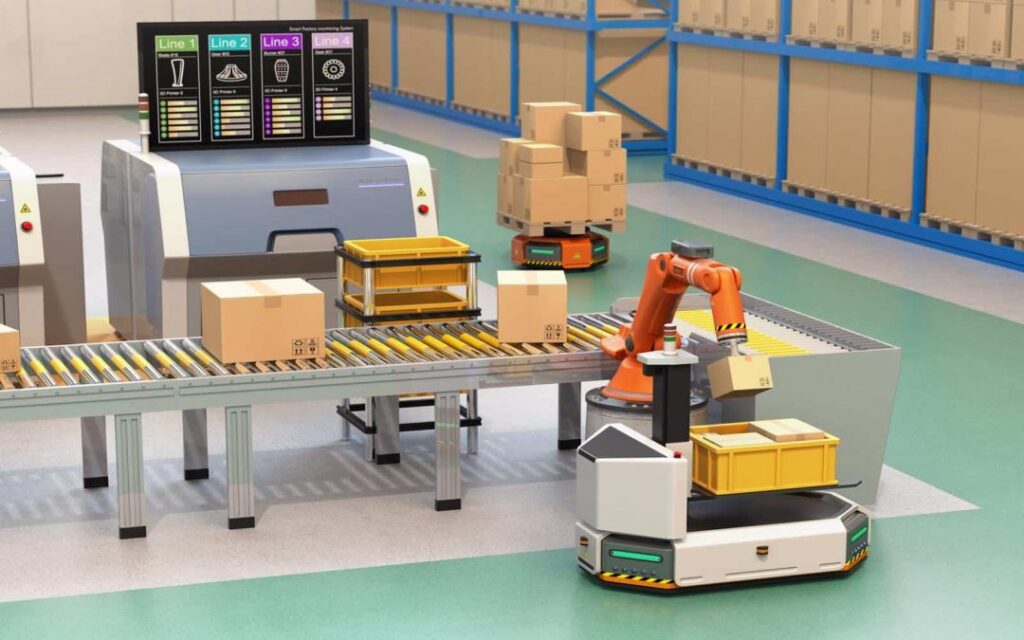
In the ever-evolving landscape of supply chain management, the advent of smart warehousing has emerged as a transformative force, reshaping traditional warehouse operations with advanced technologies and intelligent systems. “What is smart warehousing?” is a question at the forefront of discussions surrounding modern logistics. This innovative approach integrates automation, robotics, data analytics, and other cutting-edge technologies to optimize warehouse processes, enhancing efficiency and accuracy.
What is smart warehousing?

Smart warehousing refers to the use of advanced technologies and intelligent systems to optimize and enhance various aspects of warehouse operations. The goal of smart warehousing is to improve efficiency, accuracy, and overall performance within the warehouse environment. Key technologies involved in smart warehousing include automation, data analytics, the Internet of Things (IoT), artificial intelligence (AI), and robotics.
How does smart warehousing benefit retailers?
Smart warehousing offers several benefits to retailers, contributing to improved efficiency, reduced costs, and enhanced customer satisfaction. Here are ways in which smart warehousing benefits retailers:
Enhanced Operational Efficiency:
- Automation and robotics streamline various warehouse processes, such as order picking, packing, and sorting, leading to faster and more accurate fulfillment of customer orders.
- Smart warehousing systems use real-time data and analytics to optimize inventory management, ensuring that products are stocked efficiently based on demand patterns.
Reduced Costs and Resource Optimization:
- Automation in smart warehouses reduces the reliance on manual labor for repetitive tasks, leading to cost savings in labor expenses.
- Predictive analytics and AI-driven insights help retailers optimize inventory levels, preventing overstocking or stockouts, thereby minimizing carrying costs and potential losses.
Accurate Order Fulfillment:
- The use of technologies like RFID, barcodes, and IoT sensors ensures accurate tracking and tracing of inventory throughout the supply chain.
- Retailers can achieve a higher level of order accuracy, reducing the likelihood of shipping errors and customer dissatisfaction.
Improved Customer Experience:
- Faster and more accurate order fulfillment contributes to a better customer experience. Smart warehousing systems enable retailers to meet customer demands for quicker delivery times and reliable service.
- Real-time visibility into inventory levels and order status allows retailers to provide customers with accurate and timely information, enhancing transparency and trust.
Adaptability to Changing Market Conditions:
- Smart warehousing systems leverage data analytics and AI to analyze market trends and consumer behavior, helping retailers make informed decisions.
- The flexibility and scalability of smart warehousing solutions enable retailers to adapt quickly to changes in demand, seasonal variations, and other market dynamics.
In summary, the adoption of smart warehousing technologies empowers retailers to operate more efficiently, respond to customer demands effectively, and stay competitive in an increasingly dynamic market. The benefits extend beyond the warehouse walls, positively impacting the entire supply chain and customer satisfaction levels.
7 smart warehousing techniques & technologies to implement

Implementing smart warehousing techniques and technologies can significantly enhance efficiency and productivity in warehouse operations. Here are seven smart warehousing techniques and technologies to consider:
Warehouse Management System (WMS):
- Implementing a robust WMS is foundational to smart warehousing. WMS software helps manage and optimize various warehouse processes, including inventory tracking, order fulfillment, and workforce management.
- Features may include real-time inventory visibility, order tracking, and automated alerts for low stock levels.
Automation and Robotics:
- Deploy automated systems and robotics for tasks such as picking, packing, and sorting.
- Automated guided vehicles (AGVs) and robotic arms can improve accuracy, speed up processes, and reduce the reliance on manual labor.
Internet of Things (IoT) Sensors:
- Utilize IoT sensors to gather real-time data on the condition and location of inventory.
- Monitor factors such as temperature, humidity, and motion to ensure the quality of goods and enable proactive maintenance.
Barcode and RFID Technology:
- Implement barcodes and Radio-Frequency Identification (RFID) tags for accurate and efficient tracking of inventory.
- These technologies enhance visibility, reduce errors, and contribute to faster order fulfillment.
Data Analytics and Predictive Analytics:
- Leverage data analytics tools to gain insights into warehouse operations, demand forecasting, and inventory trends.
- Predictive analytics can help retailers anticipate demand, optimize stock levels, and enhance overall supply chain management.
Cloud Computing:
- Utilize cloud-based solutions to centralize and access warehouse data in real-time.
- Cloud computing supports scalability, flexibility, and collaboration, allowing stakeholders to access information from anywhere.
Artificial Intelligence (AI):
- Implement AI-driven solutions for tasks such as demand forecasting, route optimization, and predictive maintenance.
- Machine learning algorithms can continuously improve processes based on historical data and evolving patterns.
These smart warehousing techniques and technologies can be implemented individually or in combination, depending on the specific needs and goals of the warehouse. The integration of these technologies contributes to a more efficient, agile, and responsive warehouse, ultimately benefiting the entire supply chain and improving customer satisfaction.
Why is smart warehousing important?

Smart warehousing is important for several reasons, as it brings about transformative changes in traditional warehouse operations, enhancing efficiency, accuracy, and adaptability to the demands of modern supply chains. Here are reasons why smart warehousing is important:
Improved Operational Efficiency:
- Smart warehousing leverages automation, robotics, and advanced technologies to streamline and optimize various warehouse processes. This leads to faster order fulfillment, reduced processing times, and overall improved operational efficiency.
- Automated systems can handle repetitive tasks, allowing human workers to focus on more complex and value-added activities.
Enhanced Accuracy and Precision:
- The use of technologies such as barcodes, RFID, and IoT sensors ensures accurate tracking and tracing of inventory. This reduces errors in order fulfillment, minimizes stock discrepancies, and enhances overall inventory accuracy.
- Automation and robotics contribute to precision in tasks like picking and packing, further reducing the likelihood of mistakes.
Real-time Visibility and Data-driven Decision-making:
- It provides real-time visibility into inventory levels, order status, and other key metrics. This enables warehouse managers to make data-driven decisions promptly.
- Data analytics tools offer insights into historical performance, allowing for continuous improvement and better strategic planning.
Adaptability to Market Changes:
- The flexibility and scalability of smart warehousing systems enable warehouses to adapt quickly to changes in demand, seasonality, and market conditions.
- Predictive analytics and AI-driven solutions help warehouses anticipate trends and optimize inventory levels, ensuring they can meet customer demands effectively.
Cost Savings and Resource Optimization:
- Automation in smart warehouses reduces the reliance on manual labor for routine tasks, leading to cost savings in labor expenses.
- Optimized inventory management and order fulfillment processes contribute to reduced carrying costs, minimizing the financial impact of excess stock or stockouts.
In summary, It is crucial for modern supply chain management. It not only addresses the challenges posed by the increasing complexity of logistics but also positions warehouses to be more responsive, adaptable, and capable of meeting the evolving expectations of consumers and businesses alike. The integration of smart technologies ultimately contributes to a more efficient and resilient supply chain ecosystem.